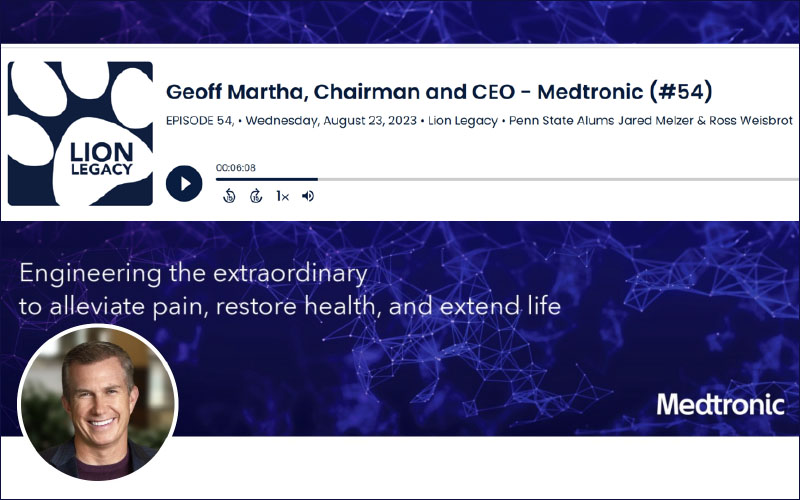Penn State alumnus Geoff Martha is Chairman & CEO of Medtronic, a global leader in healthcare technology. He recently appeared on episode #54 of the Lion Legacy podcast, talking about miniaturization, AI, robotics and other disruptions in healthcare. Listen here.
These are FDA approved products out on the market today, and the AI-driving robots, that’s coming soon to an operating theater new you.
In the wide-ranging discussion, Martha discusses his journey from Happy Valley to his current CEO role, delves into the fascinating and fast-evolving world of healthcare technology, and talks about how Penn State prepared him for leadership and life. Of particular interest are his insights into how innovations in robotics and artificial intelligence are already transforming the space with even more mind-blowing developments just over the horizon…
- Robotics: “We’re seeing a huge influx of robotics and all things surgical, even to this day. So robotics are still relatively new, in the grand scheme of things. There’s still a lot of runway here. But what it’s doing is starting to automate parts of procedures that surgeons do. And down the road, think: self-driving cars in the operating room. These robots will be self-driving, and the impact of this, it’ll democratize good surgery. Because today, you’re really highly relying on surgeons that have world-class training to get world-class surgery. And the reality of it is we can’t train enough surgeons to satisfy the world’s need here. So I think robotics is a big one.”
- Medtronic Robots: “We’re on the beginning stages of this. I’m excited. Medtronic has a number of plays in surgical robotics and what they call soft tissue surgery. So think urology, gynecology, abdominal type of procedures. We have a robot for spine surgery; we have one for cranial surgery. So it’s pretty exciting.”
- “Self-Driving” AI: “I mentioned the self-driving robots doing surgery. AI will enable that. We’re not there yet, but we’re definitely testing these right now in our labs. And I definitely see a day in the not too distant future where you’ll have self-driving robots, and this will be driven by artificial intelligence.”
- AI Colonoscopy: “Artificial intelligence is impacting every industry, all healthcare, and it’s really impacting our space in the medical technology area. Just one example: colonoscopy. It’s standard of care for a very avoidable cancer, colon cancer, and you’re supposed to start getting these colonoscopies age 45. There’s a camera that goes ‘you know where,’ and you get a little graphic, and the surgeons are looking for polyps that are hard to pick up. They’re very indistinct… and especially if they’re doing like 10 of these a day, their eyes get tired, and they miss things. And we put AI in there. We’ve trained artificial intelligence with video from our data to find these polyps, and we’re finding that surgeons actually miss maybe 50% of these. There’s a high correlation between these polyps and colon cancer, and the AI is detecting it. That’s one area where it’s not replacing doctors – and that’s going to be a long time away – but it makes them better.”
- AI Detecting AFib: “Another one that’s out in the market today: You’ve probably heard of atrial fibrillation or Afib. This is a growing issue for patients. As the population gets older, AFib is more prevalent. It causes deadly things like stroke. The problem with Afib, it’s really hard to pick up. And we have a device that’s sort of just under the skin. It’s the size of a paperclip, and it’s connected to your phone and into the Cloud. And we monitor people for 24 hours a day for Afib. Using the data that we have, Medtronic, after millions of these implants and billions of hours of ECG testing, we’ve trained an algorithm to pick up Afib and 99% of the time eliminate false positives, because there used to be a lot of false positives sent to doctors, which became noise to them and a problem. We used AI to eliminate these sensitive and specific false positives, and it’s creating a new standard of care for AFib monitoring.”
On the value of his Penn State experience and how it helped prepare him for his professional journey, Geoff says…
- “I had just a fantastic Penn State experience from an academic standpoint. I was fortunate enough to get in the Honors Program, which helps from an academic standpoint and creates like a small school within a large school, smaller classes, extra academic support that you received. I got linked up with some great mentors there… not only great teachers, but great mentors that academically and professionally helped me map out the next four years of my college career my freshman year, including, ‘these are the types of internships you need to get, these are the types of companies you need to connect with now as a sophomore,’ and that really got me off on the right foot from a kind of an academic and, eventually, a professional standpoint. And then the hockey team gave me such a sense of fulfillment and self worth, and it taught me teamwork and resiliency. It was my my family within Penn State, and Penn State’s this huge university. Advice I give students is you have to find your pocket in there. Get the benefits of a large university, and make sure you find your affinity group, your family within that large ecosystem.”







